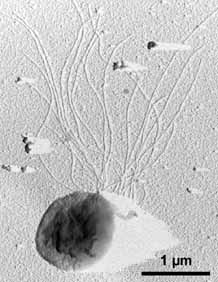
From Melanie Schefft at University of Cincinnati Magazine:
UC geologist uncovers 2.5 billion-year-old fossils of bacteria that predate the formation of oxygen.
They are sulfur-oxidizing bacteria.
The 2.52 billion-year-old sulfur-oxidizing bacteria are described by Czaja as exceptionally large, spherical-shaped, smooth-walled microscopic structures much larger than most modern bacteria, but similar to some modern single-celled organisms that live in deepwater sulfur-rich ocean settings today, where even now there are almost no traces of oxygen.
In his research published in the December issue of the journal Geology of the Geological Society of America, Czaja and his colleagues Nicolas Beukes from the University of Johannesburg and Jeffrey Osterhout, a recently graduated master’s student from UC’s department of geology, reveal samples of bacteria that were abundant in deep water areas of the ocean in a geologic time known as the Neoarchean Eon (2.8 to 2.5 billion years ago).
“These fossils represent the oldest known organisms that lived in a very dark, deep-water environment,” says Czaja. “These bacteria existed two billion years before plants and trees, which evolved about 450 million years ago. We discovered these microfossils preserved in a layer of hard silica-rich rock called chert located within the Kaapvaal craton of South Africa.”
With an atmosphere of much less than one percent oxygen, scientists have presumed that there were things living in deep water in the mud that didn’t need sunlight or oxygen, but Czaja says experts didn’t have any direct evidence for them until now.More.
The next big puzzle would be to understand the sulfur-dependent bacteria’s relationship with oxygen-dependent life forms, no? Apart from being alive, the sulfur crowd never amounted to much. Was there something that held them back? Real answers create more questions.
See also: What we know and don’t know about the origin of life
Follow UD News at Twitter!